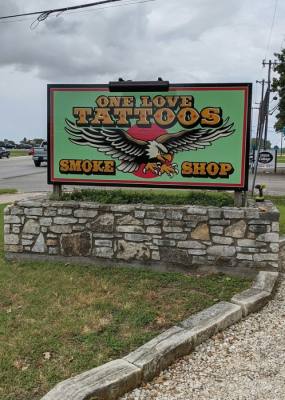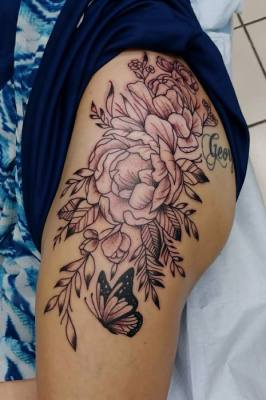Jennifer Brown, a fourth-generation Georgetown resident, originally opened the shop in May 2012 with husband Travis Crow. Business was good, and One Love expanded to include a smoke shop as well.
Every Friday the 13th, the shop offers $20 tattoos, an industry tradition, according to Brown. Typically, One Love will do a minimum of 200 tattoos during the event, but on March 13 business was half that. For Brown, this was a first sign the coronavirus pandemic was going to affect business.
The shop decided to allow only one artist to work on the premises at a time to maintain social distancing but then decided to temporarily stop tattooing altogether even though it was not legally enforced yet.
Regulations heightened and lasted longer than Brown expected. Since CBD was deemed essential, she was able to keep the smoke shop portion of the business open, which served as a life line, she said.
“We started offering curbside pickup and free delivery if they lived in Georgetown and took payment information over the phone,” she said.
At the same time, Brown found out she would not be able to renew her building lease, so she found a new building and worked to get a certificate of occupancy and utilities turned on. She buckled down and moved her display cases and products in the dark, she said.
As Texas began its phased reopening, Brown said she expected tattoo shops to be in conjunction with hair salons, barbershops and tanning salons because they are taxed the same and go through the same state licensing department—but that did not happen. Other personal service businesses opened, but tattoo shops were dubbed as entertainment businesses and denied to open.
“I would get 10 to 20 phone calls a day asking if we were open for tattoos and piercings, and I’d explain no, we want to play by the rules and wait to be allowed to legally open,” she said. “There is already a [negative] stereotype with tattoos.”
In a way, tattoo shops are a safer, cleaner place than a restaurant, for example, Brown said.
“Artists have to go through yearly training for infectious diseases and blood-borne pathogens,” she said. “We have to assume everyone could have something and have to protect ourselves and future clients. On top of that, the Department of State Health Services has inspectors to visit the shops and make sure they are in compliance. We use the same medical supplies and cleaning products like your clinic or dental facility that has been allowed to conduct business.”
On May 18 the tattoo industry was permitted to reopen, but Brown was still waiting to have her special-use permit approved by the city due to city code putting heavier restrictions on tattoo shops.
“Tattooing, while completely mainstream now, is still controlled by the laws written by a generation where tattooing was considered only for those of little morals,” she said. Today [many people] have them—doctors, police, nurses, teachers, etc. They are a form of self expression.”
Brown said she believes the type of laws that roadblocked her ability to open in Georgetown are the same laws that did not initially include tattoo shops as a professional service in the plan to reopen Texas.
She requested the Georgetown City Council exempt one component—adding a sidewalk—of the special-use permit requirements and agreed to fulfill the others, such enhancing the landscape.
Council approved the special-use permit with the exemption June 23, and the business had appointments ready.
"Sadly it took them a little over two months to approve when cases weren't as high," Brown said. "This week [July 1] because of the amount of positive COVID-19 tests in our community we've decided to halt tattoo appointments until [positive test] numbers are back under 10%. We're trying to be proactive. The close proximity for extended periods of time are not recommended, and we cannot afford to stop all operations if one of us gets sick."
One Love is still doing piercings, with the exception of those in the mouth, since it does not take more than 10 minutes, including paperwork, Brown said.
"The smoke shop is open for retail," she said. "We're hoping the ordinance for face masks will help slow the spread so we can get back to tattooing."







